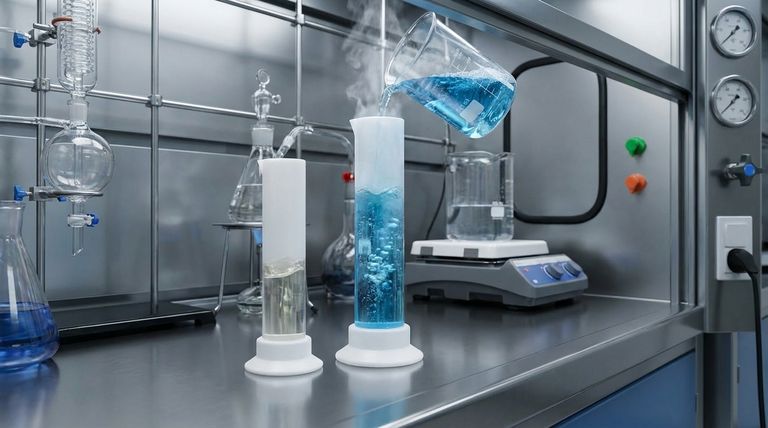In short, PTFE (polytetrafluoroethylene) is a high-performance synthetic polymer composed entirely of carbon and fluorine, best known by the brand name Teflon. Its defining characteristics are exceptional chemical resistance, an extremely low coefficient of friction (making it non-stick), and stability across a wide range of temperatures. These properties make it one of the most versatile and valuable materials in modern engineering.
The source of PTFE's remarkable properties is the incredibly strong bond between its carbon and fluorine atoms. This powerful bond creates a dense, stable, and chemically inert molecule, making PTFE uniquely resistant to heat, chemicals, and adhesion.

The Chemical Foundation of PTFE
To truly understand PTFE, we must look at its molecular structure. Its unique characteristics are not random; they are a direct result of its simple but powerful chemical makeup.
What is a Synthetic Fluoropolymer?
PTFE is a synthetic fluoropolymer. This simply means it's a man-made polymer (a large molecule made of repeating subunits) where the atoms bonded to the carbon backbone are fluorine.
The Power of the Carbon-Fluorine Bond
The bond between carbon and fluorine is one of the strongest single bonds in organic chemistry. In PTFE, a chain of carbon atoms is completely encased by a sheath of fluorine atoms.
This dense fluorine sheath effectively shields the vulnerable carbon backbone from outside chemical attack. It creates a molecule that is non-reactive and incredibly stable.
Core Properties Explained
The unique molecular structure of PTFE gives rise to a set of highly desirable engineering properties.
Extreme Chemical Resistance
Because of its stable C-F bonds, PTFE is chemically inert. It is resistant to nearly all chemicals, acids, and solvents, making it invaluable for use in corrosive environments.
Exceptional Thermal Stability
PTFE performs reliably across an enormous temperature range, from cryogenic conditions around -212°C up to 260°C (-350°F to 500°F). It has a very high melting point of approximately 327°C (620°F).
Low Coefficient of Friction
PTFE has one of the lowest coefficients of friction of any known solid, typically between 0.05 and 0.09. This is the property that makes it famous as a non-stick coating for cookware and ideal for low-friction bearings and seals.
Excellent Electrical Insulation
PTFE is an outstanding electrical insulator with a very low dielectric constant. This makes it a preferred material for high-frequency applications like coaxial cables and printed circuit boards.
Hydrophobicity and Cleanliness
PTFE is hydrophobic, meaning it repels water and oils. This contributes to its non-stick nature and makes surfaces coated with it very easy to clean.
High Flexural Strength
The material is highly flexible and can bend or be flexed repeatedly without breaking or losing its structural integrity, especially at low temperatures.
Understanding the Practical Trade-offs
No material is perfect. While PTFE's properties are exceptional, it's critical to understand its limitations for proper application.
Low Mechanical Strength
While very flexible, PTFE is a relatively soft material. It is not suitable for high-load structural applications and can be susceptible to creep (deformation under sustained pressure).
Susceptibility to Abrasion
The same low-friction quality that makes PTFE non-stick also means it has poor wear resistance. It can be easily scratched or worn away by abrasive materials.
Processing Challenges
PTFE's high melting point and high melt viscosity make it more difficult to process than common plastics. It cannot be easily injection molded or extruded using conventional methods.
Making the Right Choice for Your Application
Selecting PTFE depends entirely on whether its unique strengths align with your primary goal.
- If your primary focus is chemical inertness: PTFE is an unparalleled choice for seals, gaskets, linings, and tubing in aggressive chemical processing.
- If your primary focus is reducing friction: It is the go-to material for non-stick coatings, self-lubricating bearings, and other low-drag surfaces.
- If your primary focus is thermal and electrical resistance: PTFE is ideal for high-performance wire insulation, circuit boards, and components that must operate in extreme temperatures.
Ultimately, PTFE is a problem-solving material chosen specifically for its ability to perform where other materials fail.
Summary Table:
| Property | Key Characteristic | Typical Value/Range |
|---|---|---|
| Chemical Resistance | Resistant to nearly all chemicals and solvents | Highly Inert |
| Thermal Stability | Wide operating temperature range | -212°C to 260°C (-350°F to 500°F) |
| Coefficient of Friction | Extremely low, non-stick surface | 0.05 - 0.09 |
| Electrical Insulation | Excellent insulator, low dielectric constant | High Performance |
Need a high-performance PTFE component for your application?
At KINTEK, we specialize in manufacturing precision PTFE components—including seals, liners, and labware—for the semiconductor, medical, laboratory, and industrial sectors. Whether you require a custom prototype or a high-volume production run, our expertise ensures a solution that leverages PTFE's superior properties to solve your most challenging problems.
Contact our experts today to discuss your specific requirements and get a quote!
Visual Guide

Related Products
- Custom PTFE Measuring Cylinders for Advanced Scientific and Industrial Applications
- Custom PTFE Parts Manufacturer for Teflon Parts and PTFE Tweezers
- Custom PTFE Parts Manufacturer for Teflon Containers and Components
- Custom PTFE Square Trays for Industrial and Laboratory Use
- Customizable PTFE Seals Filter Holders for Versatile Applications
People Also Ask
- Are there any chemical compatibility limitations for PTFE? Understanding Its Specific Vulnerabilities
- How do Teflon and UHMW compare in terms of applications and characteristics? Choose the Right High-Performance Polymer
- What are the key properties of PTFE in terms of thermal and chemical resistance? Unmatched Performance for Demanding Applications
- In which industries is Teflon commonly used? Essential for Chemical, Medical, and Aerospace
- What is the monomer used in the preparation of PTFE? Mastering the Synthesis of Tetrafluoroethylene
- What is the difference between PTFE and Teflon? Uncover the Truth to Make Smarter Sourcing Decisions
- What makes PTFE suitable for piping and tubing systems? Unlock Superior Chemical Resistance and Durability
- How does PTFE perform in high-temperature and dirty environments? Discover its Resilience and Reliability



















